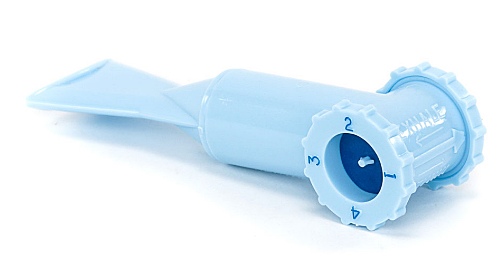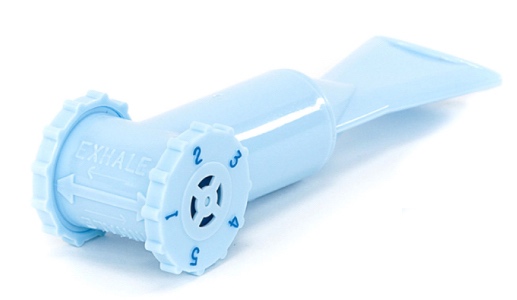PN Medical, a pulmonary speech technology company, and home care clinical software developer Orbita, are partnering to develop PN Medical’s next-generation Breather+ respiratory muscle training (RMT) device for remote care management.
Sensors  embedded in Breather+ will capture lung function data and send it to an Orbita remote care management dashboard via Orbita’s secure cloud-based platform for creating and managing digital home healthcare applications.
embedded in Breather+ will capture lung function data and send it to an Orbita remote care management dashboard via Orbita’s secure cloud-based platform for creating and managing digital home healthcare applications.
The new product is a bluetooth-enabled RMT device for patients with abnormal breathing function or shortness of breath, and problems with speech and swallowing due to decreased breath support. Disorders and conditions supported include chronic obstructive pulmonary disease (COPD), stroke, asthma, congestive heart failure, Parkinson’s disease, muscular dystrophy, multiple sclerosis, myasthenia gravis, vocal fold pathologies, ventilator/trach weaning, dysphagia, spinal cord injury, sleep apnea, and hypertension.
PN Medical says it chose Orbita as a partner to help advance the company’s goals of improving lives and reducing healthcare costs for people who suffer from those conditions and to leverage Orbita’s unique digital platform that provides monitoring and support for patients in home therapy. The ultimate goal is to improve outcomes and reduce re-admission risks by supporting complete and timely patient data and secure care coordination.
The Breather+ is used diagnostically to measure lung capacity and therapeutically to improve breathing function as patients perform inhaling and exhaling exercises. Sensors embedded in the device capture lung function and patient adherence data which is instantly sent to the Orbita-powered practitioner dashboard via the Breather+ mobile app in real time. 
The FDA Class 1 Inspiratory/Expiratory RMT device has been in service for 30 years with more than one million units sold, according to PN Medical. The first of its kind, the original Breather device was invented in 1979 by the company’s then Chief Clinical Officer Peggy Nicholson, a former respiratory therapist. More than 60 patents have referenced the Breather’s simple, effective design.
PN Medical notes that increasing muscle strength with resistance training is effective in peripheral skeletal and respiratory muscles, and that breathing against resistance during RMT strengthens inspiratory muscles — the diaphragm and external intercostals, the accessory muscles of neck, expiratory muscles — the internal intercostals and abdominals. In addition, it also helps in the movement of hyolaryngeal complex, generates improved airflow through vocal folds, improves respiratory support for safe swallow function, improves protective cough and assists in airway clearance, promotes diaphragmatic breathing, decreases shortness of breath, improves blood flow to resting and exercising limbs, and improves both general health and quality of life by promoting regained activity and exercise tolerance.
Orbita was founded by customer management software industry veterans who put their expertise to work by building user solutions that improve at home care for people with age-related and chronic health issues. Orbita’s monitoring platform gathers data from wearable device, home health devices, and other connected devices.
 “In 1980, we were first to market with The Breather, our revolutionary respiratory device. Now, thanks to our partnership with Orbita, were leading the way again in transforming healthcare at home,” said PN Medical CEO Mark A. Carbone in a press release.
“In 1980, we were first to market with The Breather, our revolutionary respiratory device. Now, thanks to our partnership with Orbita, were leading the way again in transforming healthcare at home,” said PN Medical CEO Mark A. Carbone in a press release.
The Breather+ device and Orbita remote monitoring platform support early intervention and more targeted, personalized treatment, which Carbone says will not only reduce emergency room visits, but also continue improving quality of life for patients.
 Orbita’s Chief Executive Officer Bill Rogers said he is pleased with the partnership.
Orbita’s Chief Executive Officer Bill Rogers said he is pleased with the partnership.
“We are seeing just how powerful technology can be in solving patient adherence challenges and addressing fragmented communication and collaboration among patients, their caregivers and clinicians. It’s all about engaging patients, informing caregivers and empowering providers,”Rogers said.
Carbone’s passion for PN Medical was inspired by his parents — both cardiac and pulmonary disease patients.
“I witnessed the patient/provider breakdown firsthand, and was emboldened to find a way to do something about it,” Carbone said. “Anything to keep my dad from going back to the hospital when he could stay home was his wish to me. This new technology is allowing us to do just that.”


This kind of a platform for respiratory care sounds so fascinating. I think it’s so interesting how the system can be controlled by a Bluetooth remote. That would make home care systems more efficient and maybe even more safe. I have had asthma since I was in high school, so a topic like this is very important to me.
An awesome product that will benefit so many people. After working in home health care and seeing the many patients with these disorders, this device is a god send. I hope that we can incorporate this into the field and promote wellness!
Can these be purchased in Australia please?
Dear Brian, You can find more information on the device and how to order it in the website https://www.pnmedical.com/the-breather/